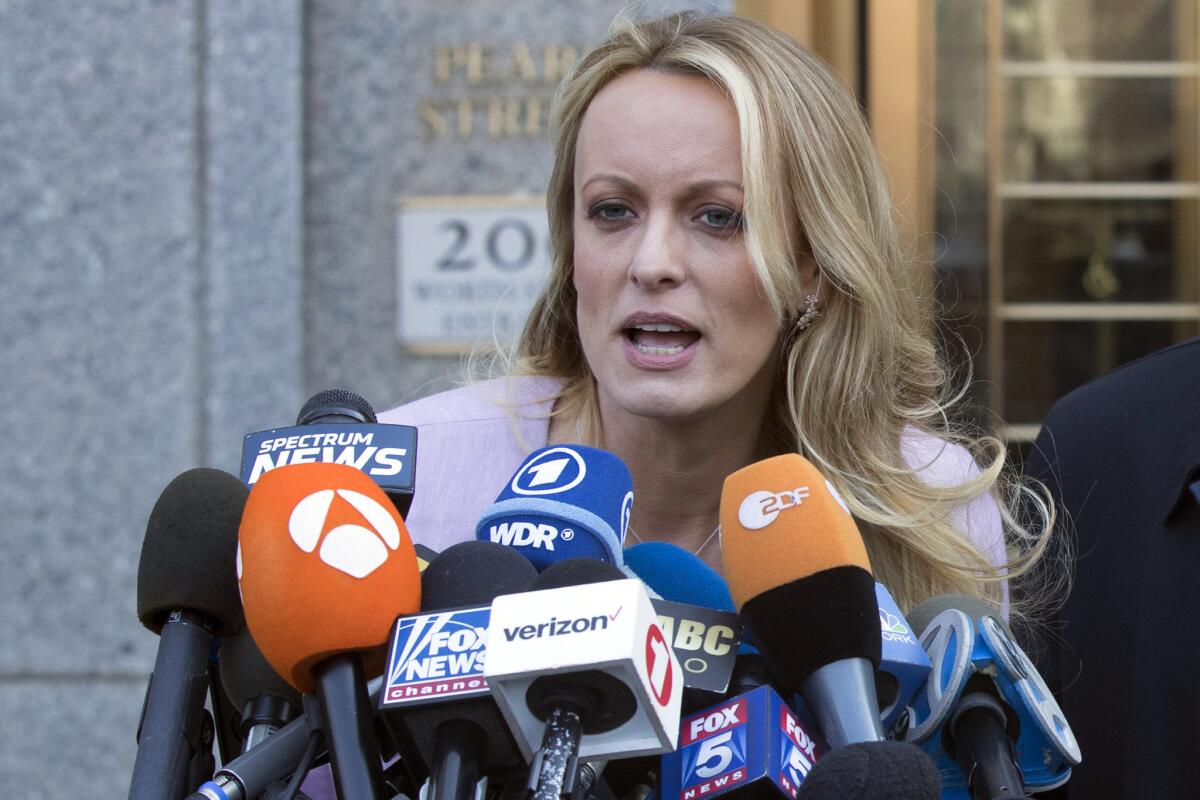Stormy Daniels picks new fight with President Trump over defamation ruling

An attorney representing Stormy Daniels in her legal battle with President Donald Trump is requesting that a panel of federal judges reinstate her defamation claim, accusing the president of intentionally tarnishing the pornographic actressâs credibility.
Trumpâs 2018 tweet mocked a forensic artistâs sketch of a man whom Daniels said had threatened her in 2011 if she spoke publicly about her alleged 2006 sexual encounter with Trump. The president has denied having sex with Daniels.
âA sketch years later about a nonexistent man,â Trump tweeted. âA total con job, playing the Fake News Media for Fools (but they know it)!â
The sketch had been released by attorney Michael Avenatti, who at the time was representing the adult-film actress whose real name is Stephanie Clifford.
A U.S. District Court judge ruled later that year that Trumpâs tweet was protected under the First Amendment and dismissed Danielsâ complaint.
On Tuesday, Danielsâ new attorney, Clark Brewster, went head-to-head with Trumpâs lawyer, Charles J. Harder, at the federal appeals courthouse in Pasadena. A ruling was not immediately issued but a published decision should be released in 30 to 90 days.
In court, Brewster focused on what he described as the previous judgeâs mistake in granting Trumpâs motion under the Texas Citizens Participation Act, which places a higher burden on the plaintiff in defamation lawsuits by making it easier for a defendant to invoke free speech rights and to ask the court to quickly dismiss the lawsuit and make the plaintiff pay the defendantâs legal expenses.
Most states have enacted statutory protections similar to Texasâ against SLAPP (strategic lawsuit against public participation) lawsuits.
Instead, Brewster said, the Federal Rules of Civil Procedure shouldâve been applied because the legal battle took place at the federal level. Under this mandate, factual allegations in complaints are viewed âas true and constructed in the light most favorable to the plaintiff,â according to the lawsuit.
Brewster also pushed back against the previous judgeâs ruling, contending that portions of Trumpâs tweet are verifiable factual assertions.
Trump retweeted another user who wrote âOops! This is awkward! @StormyDanielsâs EX #IDTheThugâ and shared side-by-side photos of the sketch and of Danielsâ ex-husband with an embarrassed emoji.
Harder commended the previous judgeâs ruling and contended that the Texas statute was nearly identical to Californiaâs anti-SLAPP statute. He also painted a different picture of Trumpâs tweet.
âThat one tweet was the only response to the onslaught of publicity,â Harder said, citing television shows and interviews Daniels and Avenatti did about the alleged incident.
Harder held up a copy of Trumpâs tweet and read it out loud and emphasized how the president riffed off the original tweetâs âhyperbolic statement.â
Judge Kim McLane Wardlaw pressed Harder as to whether part of Danielsâ allegations could be verifiable.
âContext is important,â he responded. âThe district court got it right. This is vintage hyperbole.â
Daniels was ordered to pay nearly $293,000 in attorney fees and $1,000 in sanctions following the previous ruling. Brewster said she hasnât paid those fees as of this week because an official order wasnât submitted. If Daniels prevails in her appeal, Brewster said, that order would be moot.
Daniels also sued to void an October 2016 nondisclosure agreement that prevents her from talking about her alleged affair with Trump. Danielsâ request that Trump pay her attorneyâs fees are pending in state court, according to Brewster.
Times staff writer Michael Finnegan contributed to this report.
More to Read
Sign up for Essential California
The most important California stories and recommendations in your inbox every morning.
You may occasionally receive promotional content from the Los Angeles Times.











